Musk warns of ‘rough’ patch after difficult quarter for Tesla while Google parent company gets AI boost

“Yeah, we probably could have a few rough quarters,” Mr Musk said. “But once you get to autonomy at scale in the second half of next year, certainly by the end of next year, I would be surprised if Tesla’s economics are not very compelling.” (AP Photo/Matt Rourke, File)
Elon Musk warned of difficult times ahead for Tesla after one of the automaker’s worst quarters in over a decade.
Tesla will be a transition period for the next year or more, losing electric vehicle incentives in the US and needing time to roll out autonomous vehicles, the chief executive officer said.











